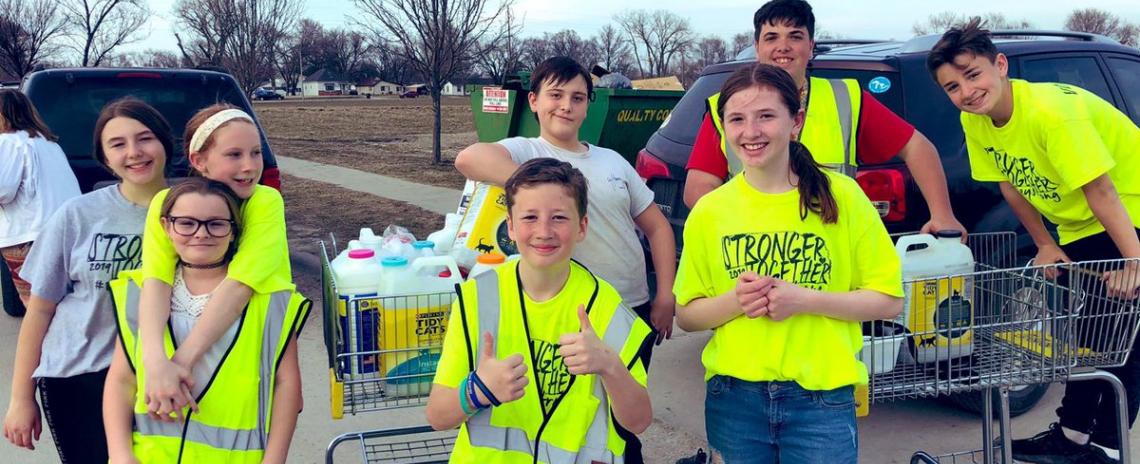Weathering the Storm: "The love and caring and support was just incredible"
Weathering the Storm: "The love and caring and support was just incredible"
By Tyler Dahlgren
Dr. Melissa Poloncic went through the list of families in the DC West school district severely impacted by the flood, and made phone call after phone call.
The Google Form had been compiled by her staff, extensive and detailing the urgent need of food, clothing, transportation and household goods. One by one, the superintendent dialed and waited for a voice on the other end of the line.
“If they needed food, we would go get a box of food and deliver it to them at the drop-off location,” Poloncic said. “If students were showing up in clothes that were dirty, because many didn’t have access to washing machines, we were washing clothes here at our facility.”
It was emotional, by far one of the most difficult things Poloncic has had to do in a job that comes with its share of tense moments.
“You were speaking to people who had just found out they had lost everything,” she said. “Emotionally, it took a toll, but in comparison to what those families were going through, it was nothing. It was the least we could do as a school district.”
When flooding became imminent, a conference call with Emergency Management, the Valley Police Department, several community officials and DC West Community Schools was scheduled for Friday, March 15th. Immediately, the district offered its building for shelter and its vehicles for transportation.
On Thursday, Poloncic lined up a handful of drivers, gave them a set of keys and placed them on call for local law enforcement. By mid-day Friday, the situation had already elevated. Roads were being closed as families scrambled to evacuate the area.
“The on-set was much faster than anyone predicted,” said Poloncic. “This literally became an island where no one could get in or out. Depending where you were at a certain time on Friday, that’s where you ended up for several days.”
Hundreds of DC West students and staff were displaced from their homes. It was the most challenging part of recovery efforts, said Poloncic, simply trying to assess who was where.
Valley wasn’t accessible until the following Tuesday and Wednesday, as families returned to their homes. Many had flooded basements, some were filled chest-high with water, and others were completely and heartbreakingly unsalvageable.
In the middle of grief, however, there was resolve. The moment school staff was able to re-enter the community, they took to the streets and offered assistance. Two communities, Valley and Waterloo, rallied together as an entire state took a natural disaster’s best punch square on the chin.

“It solidified what I always felt in this community, which is people are always there for each other,” Poloncic said. “The love and caring and support was just incredible.”
DC West received several calls from school districts in Nebraska wanting to lend help in any way possible. Poloncic went back to her Google Form and started to pair families in dire need of support with organizations and districts desperate to assist.
“I’ll use Gretna Public Schools for example,” she said. “Gretna reached out and said ‘How can we support you?’ We created an ‘Adopt a Family’ program. Gretna then could handle that however they wanted, whether it was gathering good or raising money. Our district lined those two parties together.”
Watching leaders emerge in such difficult circumstances was an amazing thing for Poloncic to witness. On Friday night, after about 60 people had been rescued by boat, some from the rooftops of their flooded homes, the school was used as a shelter. Those living in neighborhoods close to the school walked whatever bedding and furniture and food they could come up with to gymnasium, where 26 dogs had also taken shelter.
A school para-professional, maintenance worker and substitute teacher took charge and manned the operation for the first 12 hours.
“It was just everybody,” said Poloncic. “It was like they said ‘No matter what my position is here at school, I am a leader in this situation because it’s going to take all of us to get through this.’”
Poloncic is quick to commend the city’s leadership. The community set up a flood relief center at one of the town’s churches, where school personnel helped up until a return to classes was possible. Community relations at DC West have always been strong, but the two essentially blended together in recovery.
“When you’ve weathered a storm like this together, there is a different level of relationship you come out of it with,” said Poloncic.
Everyone wondered what attendance would be like after such a tumultuous week. So many students were still without stability, without an actual home. And, yet, on Monday morning, they showed up.
The kids found their friends. They hugged and they laughed.
“Everyone appreciated things a little bit more that first week back,” Poloncic said. “Things you’d typically take for granted weren’t being taken for granted any longer because of the new perspective we came out on the other end with.”
They sat in their desks, and, as teachers taught and the turbulence of the last 10 days drifted away at least for a little while, they learned.



